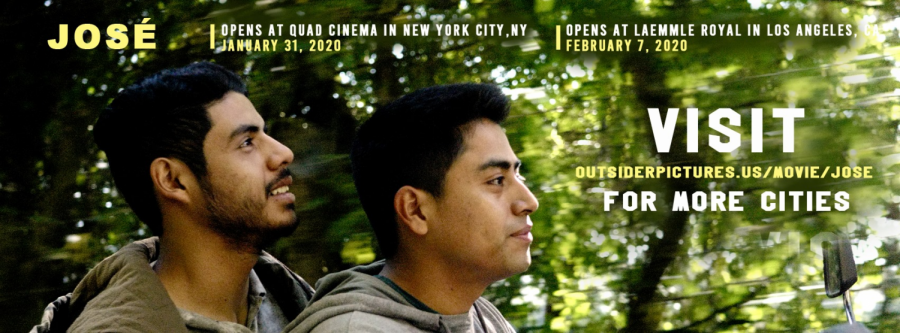“José” Struggles to Fully Captivate
There are often two types of same-sex love stories: those that end up being gay love romance films, and those that end up being veiled socio-political essays about the endless trials faced by gay lovers. “José” turns out to be more of the former — which is surprising given its locale, Guatemala City, is nestled in the heart of one of the most religious regions in the world.
Our leading man, José (Enrique Salanic), is a 19-year-old down on hard times in poor places. He spends his days serving as the front door man for a hot dog shop, encouraging passers-by to come have a bite to eat. In his free-time he’s constantly on his phone — but he isn’t playing any Candy Crush. It’s all gay dating apps for this young Guatemalan, a modern-day plot device that conveniently smoothes over the question of how he meets his lovers.
Electronic socialization very quickly turns José on to Luis (Manolo Herrera), with whom he fires up a relationship that means more than any one-night stand. Here would be the opportunity for the road not taken, where Director Li Cheng could first begin to mount up pernicious opposition to the forbidden love.
Cheng is capable of attacking from any direction he pleases in this devoutly Christian setting, thwarting passion with family, priest or police. Instead, what we get is a slow, inconclusive romance and muted, indecisive passion. The focus always rests with the two young men, what they think of each other, how they love and fight. Even when they quarrel José and Luis speak in low tones — their sex is practically silent.
Cheng films naturistically, with a maximum of reflection and distance from the action. Anytime a scene permits it he’ll jump the camera back to a vantage point a football field away, ditching the close-up of a quiet conversation for a lush tropical city panorama. He does this sonically too. He charges up the soundtrack with the racket of cars and people, substitutes the low throbbing beat of distant Latin music for dialogue, amps up the soundwaves a few decibels when talk won’t do and lets his characters bathe in moodily rhythmic background noise.
Cheng sees this cinematographic ambiguity as most important in his story. It’s unspoken: it’s a boiling subterranean feeling that relies on hard work by leads Salanic and Herrera, to surface in gestures and facial expressions.
Another romantic interaction shows José around his spacious bachelor-pad and gives an invitation for him to move in. The camera zeroes in on José’s profile to draw out a mute unease, reluctance and disgust. Cheng relies on this subtle shooting method over and over, pitching for the captive audience long silent observation sessions of José on public transportation or walking down hilly streets. These images are meant to conjure up, through close facial analysis, the pervasive uncertainty of his sexual and romantic life, but which really result in a feeling of lethargy or languor the film never escapes.
Probably the most interesting performance comes from Ana Cecilia Mota as José’s mother, a weepy woman without a husband whose relationship with José is entirely ambiguous.
Their conversation is casual enough, but left to her own devices Mota is harried, frequently and fervently praying for God to protect her hijo.
Is it Catholic devotion? Or deeper anxiety and awareness about José’s sexuality?
The question injects her character with a lively worry not seen — not permitted — in any of the film’s stoic macho men.








































































































































































































